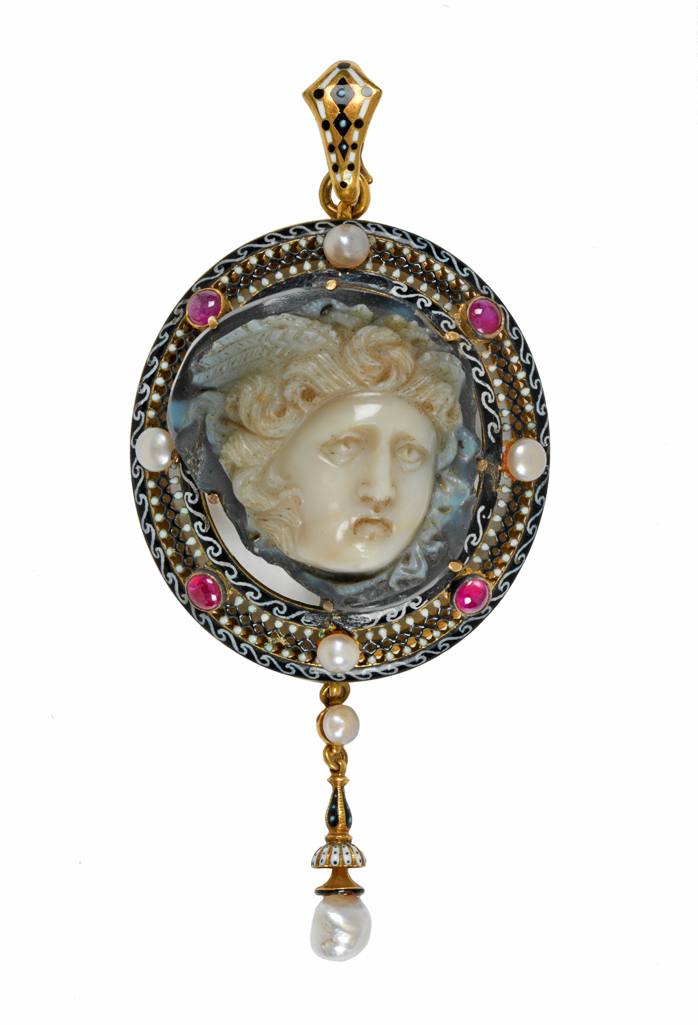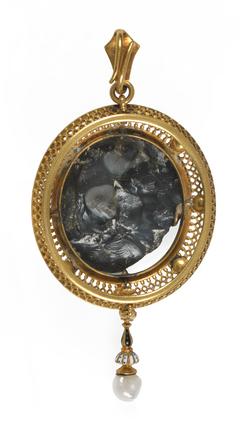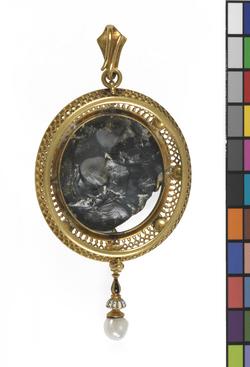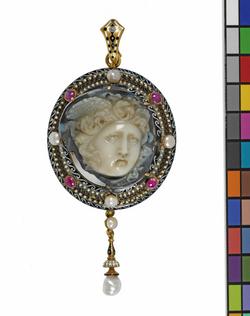Current Location: In storage
Maker(s)
Cameo cutter:
Unknown
(Cameo)
Jeweller:
Giuliano, Carlo
(Frame)
Designer:
Novissimo, Pasquale
Entities
Categories
Description
Second century Roman onyx cameo with white upper layer and dark lower layer, carved with a head of Medusa of Rondanini type. Shown frontally, the back left rough. Set by means of seven claws in an oval gold openwork frame enamelled black and white and alternately set with four pearls and four cobochon rubies. Suspended from the lower edge are a pearl, and an enamelled gold 'tassel' with a larger pearl at the end. At the top there is a ring and an enamelled gold loop for suspension.
Notes
History note: Unknown before testator
Legal notes
C.B. Marlay Bequest
Measurements and weight
Height: 8.2 cm
Width: 3.8 cm
Acquisition and important dates
Method of acquisition: Bequeathed
(1912)
by
Marlay, Charles Brinsley
Dating
2nd Century
19th Century
Circa
100
CE
-
200
CE
Note
This pendant unites a second century Roman Imperial cameo of Medusa with a Renaissance Revival style mount, by Carlo Giuliano one of the leading jewellers who worked in both the Renaissance and Archeological Revival styles. The mount is typical of Renaissance Revival designs by Pasquale Novissimo (1844-1914), a jeweller who worked with Carlo Giuliano in London. However the cameo may be a later addition to the mount, perhaps replacing a large cabochon stone, which were more common.
Founded by Carlo Giuliano, who was born in Naples and had trained in Castellani’s workshop, the successful family firm of Giuliano was praised for the spirited and varied nature of its historicist jewellery. Its best-known work was made under the direction of Carlo Giuliano, between 1860 and 1895.
School or Style
Renaissance Revival
Components of the work
Mount
composed of
gold
( enamelled)
pearls
rubies
Cameo
composed of
onyx
Depth 0.9 cm
Height 2.5 cm
Width 2.6 cm
Inscription or legends present
Inscription present: indistinct letters in oval
- Text: CG
- Location: Lower edge of the mount, on the inside
- Type: Mark
References and bibliographic entries
Related exhibitions
Identification numbers
Accession number: MAR.M.276-1912
Primary reference Number: 119030
Stable URI
Audit data
Created: Saturday 6 August 2011
Updated: Monday 28 April 2025
Last processed: Thursday 14 August 2025
Associated departments & institutions
Owner or interested party:
The Fitzwilliam Museum
Associated department:
Applied Arts









